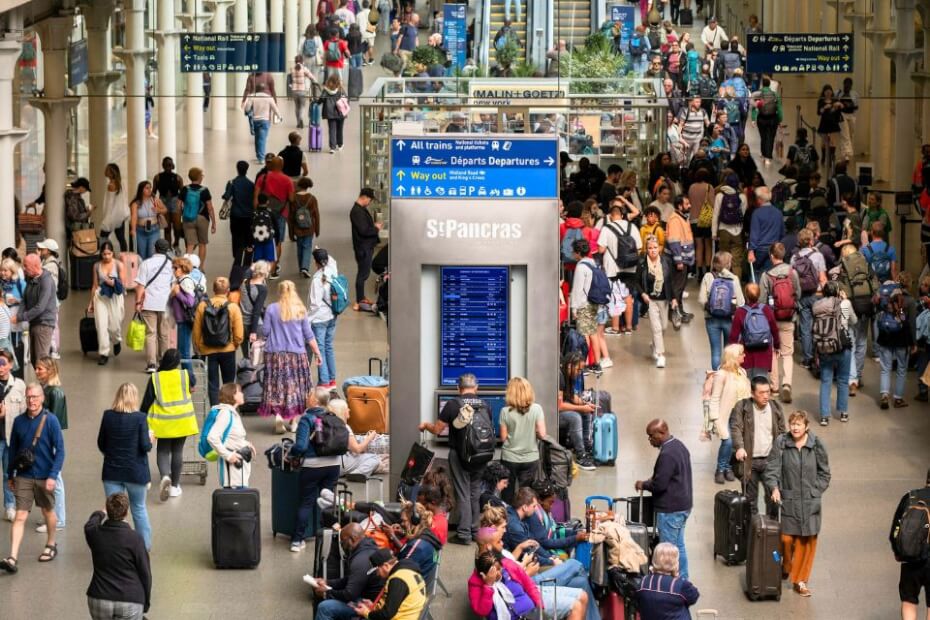
Travelers must brace for long delays once the new automated border system of the European Union (EU) rolls out.
More evidence has been submitted to the United Kingdom (UK) Parliament’s European Scrutiny Committee about the EU’s new Entry/Exit System (EES).
Alarmingly, one of the evidence submitted warned of possible 14-hour delays for travelers crossing the UK and EU borders.
The excessive waiting time is due mainly to travelers arriving in cars or coaches at the border controls.
Passengers would need to disembark to register and submit to biometric checks and then get back in their vehicle.
Under the EES, non-EU citizens traveling to the Schengen Area must record fingerprints and facial scans at the border.
Instead of passport stamping upon arrival, the EES will document entries and exits electronically using the traveler’s biometric data.
The EES implementation has been delayed multiple times but is now set to roll out in October 2024.
More evidence gathered by the UK committee
In a hearing held on 25 January 2024, several parties presented written evidence at the UK Parliament’s European Scrutiny Committee.
Ashford Borough Council, UKinbound travel trade association, Tourism Alliance, Eurostar, and Airlines UK, among others, expressed concerns about the upcoming Entry/Exit System rollout.
The evidence revealed that excessive waiting time at the borders is of the utmost concern once the EES becomes operational.
Other issues resulting in long border queues include traffic congestion along major roads and the possible decline in visitor numbers of several local businesses.
“This evidence paints an alarming picture of the possible risks surrounding the Entry/Exit System’s implementation,” Sir William Cash, Chair of the UK Parliament’s European Scrutiny Committee, said in a statement.
He added, “Clearly, this policy could have a very serious impact, not only for tourists and travel operators but also for local businesses. I implore decision makers on both sides of the Channel to take note of this evidence.”
Lengthy delays at the border affect the local economy
The Ashford Borough Council said travelers may have to wait up to 14 hours at the Port of Dover in a “reasonable worst-case” scenario.
“Queues for tourists have been quoted as a reasonable worst case of up to 14 hours,” the Council stated.
The Port of Dover officials had previously voiced that the Entry/Exit System would severely impact the ferry business.
This is because the system “would not be capable of processing current car and coach volumes” due to limited space.
“Without useable systems” in place, the Council said the EES would considerably disrupt the Kent and Ashford economy and local residents.
Lengthy delays at the port could cause vehicles to clog major roads, blocking access to the Eurotunnel in Folkestone.
“Such queues will create welfare concerns for passengers as well as having a significant effect on the local communities, specifically the towns of Dover, Folkestone, and Ashford,” the Council stressed.
Tourism organization Visit Kent also said delays at the borders could trigger the traffic management system “Operation Brock.”
In its August 2023 survey, 13 percent of businesses reported a decrease in visitor numbers ranging from one to 40 percent due to Operation Brock.
Over 50% of Kent’s attractions cited loss of footfall as a top concern. In comparison, 38% were worried about travel disruption and 21% about Operation Brock.
EES is designed for airports, not city-center terminals
Eurostar claimed the Entry/Exit System is more suited for airports than city-center terminals with limited space.
The high-speed train operator stated that implementing the EU’s new border system has been a “unique challenge.”
This is due to the juxtaposed border controls, where checks are carried out before departure instead of upon arrival.
“EES will represent a challenge for daily operations at London St Pancras International,” read the statement submitted by Eurostar.
The train operator has invested £67 million in new infrastructure and refined processes to manage the impact of EES.
Eurostar cautioned that, without the upgrades, its terminals could face queues of over an hour during peak times.
On the other hand, Getlink, the European public company that operates the Channel Tunnel, said the EES would add five to seven minutes to passengers’ overall journey time.
UK high-speed rail services operator High Speed 1 also declared that having no online pre-registration would “put enormous pressure on infrastructure at St Pancras International.”
Eurostar also warned that adjusting to the more complex border check procedures could last for an extended period.
It “will not just be the case during the first few months when high volumes of first-entry passengers are expected to register into EES,” Eurostar said.
Entry/Exit System is a step forward for travel
Despite the challenges, Eurostar asserts that ending the passport stamping scheme is a significant step forward.
Airline companies who submitted evidence at the hearing also affirmed that the EES scheme would be beneficial in the long term.
They also advised UK border authorities to be proactive and create awareness about the new system to minimize disruptions.
The EES has promised faster border checks without compromising security.
Along with the EES, the EU will also implement the new European Travel and Information and Authorization (ETIAS) in mid-2025.
ETIAS is similar to the UK’s Electronic Travel Authorization (ETA), which is mandatory for all non-visa nationals visiting the UK.
Visa-exempt nationals, including UK citizens, will need an EITAS to visit the Schengen Area.
UK’s European Scrutiny Committee is also looking at the interoperability among the EES, ETIAS, and UK ETA systems.

